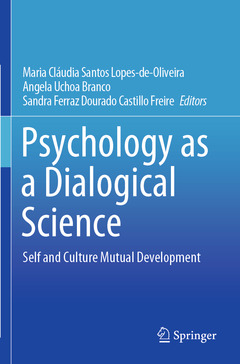Description
Psychology as a Dialogical Science, 1st ed. 2020
Self and Culture Mutual Development
Coordinators: Lopes-de-Oliveira Maria Cláudia Santos, Branco Angela Uchoa, Freire Sandra Ferraz Dourado Castillo
Language: English
Subject for Psychology as a Dialogical Science:
Publication date: 05-2021
Support: Print on demand
Publication date: 05-2020
186 p. · 15.5x23.5 cm · Hardback
Description
/li>Contents
/li>Biography
/li>Comment
/li>
- Developmental psychology
- School and educational psychology
- Social and personality psychology
- Education
- Social work
- Anthropology
- Art
Presents the theoretical and methodological principles of dialogical psychology
Shows how these principles can be applied to research and practice in different areas, such as psychology, education, social work, anthropology and art
Explains the central role played by culture and social interactions in human development
Contributes to overcome the traditional individualistic and monological paradigm in behavioral sciences




